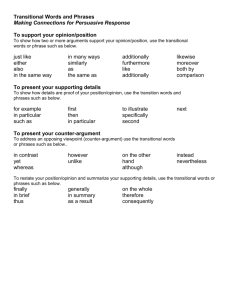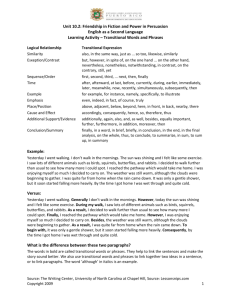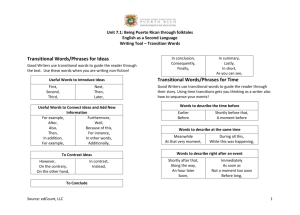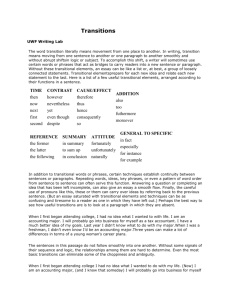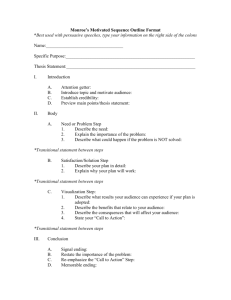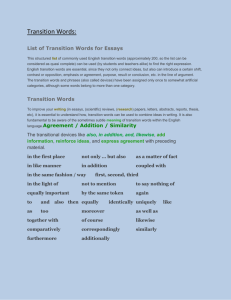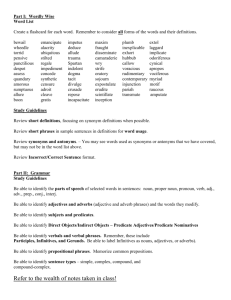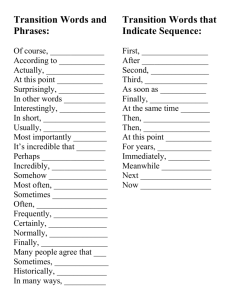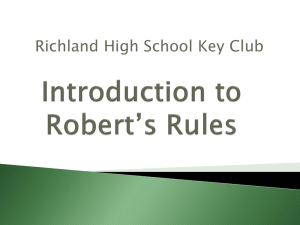THE ART OF TAKING MINUTES: 1. Transitional or connecting words
advertisement
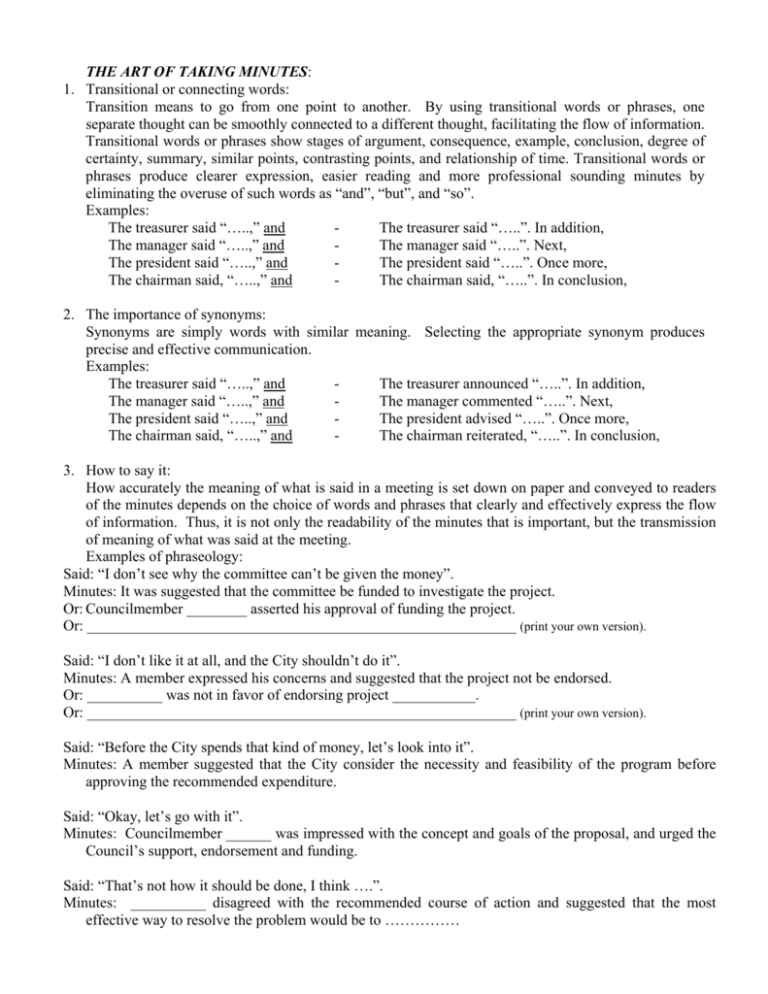
THE ART OF TAKING MINUTES: 1. Transitional or connecting words: Transition means to go from one point to another. By using transitional words or phrases, one separate thought can be smoothly connected to a different thought, facilitating the flow of information. Transitional words or phrases show stages of argument, consequence, example, conclusion, degree of certainty, summary, similar points, contrasting points, and relationship of time. Transitional words or phrases produce clearer expression, easier reading and more professional sounding minutes by eliminating the overuse of such words as “and”, “but”, and “so”. Examples: The treasurer said “…..,” and The treasurer said “…..”. In addition, The manager said “…..”. Next, The manager said “…..,” and The president said “…..,” and The president said “…..”. Once more, The chairman said, “…..,” and The chairman said, “…..”. In conclusion, 2. The importance of synonyms: Synonyms are simply words with similar meaning. Selecting the appropriate synonym produces precise and effective communication. Examples: The treasurer announced “…..”. In addition, The treasurer said “…..,” and The manager said “…..,” and The manager commented “…..”. Next, The president said “…..,” and The president advised “…..”. Once more, The chairman said, “…..,” and The chairman reiterated, “…..”. In conclusion, 3. How to say it: How accurately the meaning of what is said in a meeting is set down on paper and conveyed to readers of the minutes depends on the choice of words and phrases that clearly and effectively express the flow of information. Thus, it is not only the readability of the minutes that is important, but the transmission of meaning of what was said at the meeting. Examples of phraseology: Said: “I don’t see why the committee can’t be given the money”. Minutes: It was suggested that the committee be funded to investigate the project. Or: Councilmember ________ asserted his approval of funding the project. Or: _________________________________________________________ (print your own version). Said: “I don’t like it at all, and the City shouldn’t do it”. Minutes: A member expressed his concerns and suggested that the project not be endorsed. Or: __________ was not in favor of endorsing project ___________. Or: _________________________________________________________ (print your own version). Said: “Before the City spends that kind of money, let’s look into it”. Minutes: A member suggested that the City consider the necessity and feasibility of the program before approving the recommended expenditure. Said: “Okay, let’s go with it”. Minutes: Councilmember ______ was impressed with the concept and goals of the proposal, and urged the Council’s support, endorsement and funding. Said: “That’s not how it should be done, I think ….”. Minutes: __________ disagreed with the recommended course of action and suggested that the most effective way to resolve the problem would be to …………… THE ART OF TAKING MINUTES – transitional words Stages of argument Initially At the onset To begin with Up to the present time So far Currently In sum Lastly Finally After all In conclusion Opining that In the first place Secondly First Degree of certainty Certainly In fact As a matter of fact Surely Doubtlessly Indeed Perhaps Possibly Probably Basically In all probability To a degree To a great extent In any case Of course Contrasting points Anyway Nonetheless Nevertheless Despite this On the other hand However Still While In spite of this Then At the same time After all Although Consequence or result As a rule Therefore Accordingly Consequently Thus As a result Hence In short Otherwise Then Truly Actually Apparently Fortunately For this reason Concession After all Although this may be true At the same time Even though I admit Naturally Granted Relationship of time Foremost Formerly Beyond Eventually At the time Before As soon as At last When While Immediately Lately Later Meanwhile Presently Currently Afterwards As long as At first Until In the meantime Example Indeed In fact In other words In particular Specifically That is To illustrate For example For instance Incidentally Defining This / These Those That Summary Thus To summarize In brief To conclude In conclusion In short on the whole Briefly In essence Concisely In the final analysis Similar Point Besides Equally important Furthermore / Further Moreover Similarly In any case In like manner In addition Next Again Once more Also Incidentally Generally Again Likewise Another reason THE ART OF TAKING MINUTES – synonyms Said Addressed Advised Affirmed Aired Alleged Alluded Announced Answered Asserted Avowed Cited Commented Communicated Declared Described Detailed Disclosed Divulged Explained Expressed Informed Mentioned Named Quoted Recited Recounted Referred Related Remarked Replied Reported Responded Revealed Set forth Spoke Specified Stated Summarized Talked Thanked Told Voiced Feel appreciates assumes believes concludes deems discerns holds is aware of is impressed with judges perceives surmises trusts Give accord assign award bestow deliver dispense donate endow extend furnish grant provide supply Review analyze canvas check consider evaluate examine inspect investigate scan survey view Subject affair area business core entity item material matter object point problem proposal proposition question substance text theme topic Indicate allude argue demonstrate designate disclose display imply manifest point out reveal show signify specify stand for suggest symbolize typifies THE ART OF TAKING MINUTES: Important Action Verbs: Established Endorsed Confirmed Questioned Presented Summarized Inquired Requested Reminded Briefed the Board Warned Considered Agreed Noted Reiterated Referred Adopted Voted Granted Commended Formed Decided Expressed Welcomed Reported Stated Reviewed Indicated Informed Pointed out Predicted Suggested Stressed Observed Offered Identified the primary problem Accepted Increased Declined Distributed Conducted Disclosed Nominated Emphasized Recommended Reopened the question of Commented Described Mentioned Declared Urged Explained Announced Furnished Supplied Provided Approved Was informed Heard Deliberated Received Gathered Understood Ascertained Advised Acknowledged Acquainted Communicated Implied Instructed Directed Affirmed Accounted Discussed Ordered Denied Asked Empowered Released Continued Tabled Scheduled Determined Prescribed Amended Examined Criticized Disagreed Supported Applauded Sought Honored Chose Bestowed Congratulated Reluctantly passed Delayed a decision Failed to Allocated Launched Added Proposed Volunteered Ratified Enacted Dictated Imposed Appointed Cited Charged Rejected Restricted Created Limited Authorized Scrutinized Stipulated Clarified Appropriated Repealed Extended Allowed Expanded Revised Redefined Mandated Increased THE ART OF TAKING MINUTES Motions: A motion is a formal proposal and once made and seconded, the Mayor places the proposal before the meeting body by restating the motion. Wording of motions is of utmost importance in the minutes. Motions must be recorded as being adopted, lost for lack of a second, failed, referred to committee, amended, postponed indefinitely postponed to a specific date, or tabled. In a less formal meeting, when a member gets going on an idea, and another member says, “yes, let’s consider that a motion,” you must capture the substance of the discussion, as well as key words in formulating the motion. During the meeting there is always the apprehension that someone will ask to have a motion read back. Typically it is the complicated and controversial motion, not the short and easy one. If a motion was difficult to record, and you feel a little uncertain as to the accuracy of your notes, you should never hesitate to ask that a convoluted motion be restated to assure it is recorded properly and completely to the satisfaction of the maker. Taking a meeting cold: Taking a meeting for the first time or taking a meeting for someone else is considered taking a meeting cold. The best procedure is to study the minutes of the last several meetings, if time permits. Note the tone, style and format of the minutes i.e., formal or informal, and study the agenda. The emotional side: There is an emotional side to both taking and preparing the minutes. You are under pressure, having the responsibility of deciding what to record or what not to record in the final draft. Educated guesses as to what is important, and what parts of discussions are relevant, have to be made. Maintaining alertness for discerning when general discussion suddenly becomes pointed and significant is an important factor in taking good minutes. Each meeting has its own atmosphere depending upon the issues, the mood of the meeting body, and the personalities of the participants. This interaction of the members based on their personalities, experience, and background results in the fact that meetings are never quite predictable. Summary: Minutes are the official record of a meeting. They can be brief or lengthy, depending on the length of the meeting’s agenda subjects and the desire of the meeting body, Mayor, or management. Minutes range from a brief summary for a small and informal meeting to book form for a convention or annual meeting. Large meetings may use action minutes which record the motions only and are a temporary record until the minutes of the full proceedings are distributed in final form. Regardless of length, the minutes record the substance of a meeting in a clear, accurate, concise, informative way. The language of the minutes frequently reflect the type of meeting held. The more formal the meeting, the more formal the wording and tone should be. The language of a formal meeting requires traditional minutes phrases. The tone is impersonal and objective. The style is narrative, using few adjectives and a minimum of pronouns. Flowery descriptions, personal opinions, and long irrelevant paragraphs are not acceptable as professional language for informal or formal minutes. If in doubt about how much to put down when transcribing your notes, it is generally better to be too wordy on the initial draft which can be edited out. Do not err on the side of brevity. Good minutes serve to refresh the recollection of meeting body members on points of fact. In case of future controversies, minutes interpret actions approved by the meeting body.

